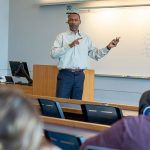Sandra M. Chafouleas, Board of Trustees Distinguished Professor and Neag Endowed Professor in the Department of Educational Psychology at the University of Connecticut, said experts are seeing an increase in concern about mental health and emotional well-being, especially among teenagers who may be missing opportunities to pursue interests, social connection and independence, at a time when communities are also facing serious economic and health impacts.
Dr. Fumiko Hoeft, director of the Brain Imaging Research Center at the University of Connecticut and faculty member at the University of California San Francisco, and Roland Hancock, associate director of the Brain Imaging Center at the University of Connecticut, conceived the app in 2014. Hoeft, along with Devin Kearns at the University of Connecticut, John Gabriell at MIT, and the Dyslexia Center at the University of California San Francisco, are leading the project, which is currently in the final validation phase.
“I think it just revealed some of the deep inequities that have existed but didn’t really surface until it was forced to,” says Neag Professor of Educational Policy Casey Cobb. “So that was one of the main things that we’ve learned. I think a lot of schools adjusted very quickly and really made new efforts and creative efforts to keep contact with their families and their kids — with home visits in a safe manner and bringing food to families in need.”
I knew what it meant to be a Black man in America well before I was a parent, before I found out that shoveling my own driveway involves risk, that buying a house brings the potential of lowering property values, that signing up my kids for an education involves countering forces that erode their self-esteem — when schools are still largely segregated and security officers are summoned disproportionately to deal with Black students. But knowing these things now, how can I leave all that at the door?
The Neag School of Education, UConn’s Department of English, and the Connecticut Writing Project (CWP), co-sponsors of the 28th annual Letters About Literature contest, are proud to announce Connecticut’s winners for the 2020-21 academic year.
James C. Kaufman, professor of educational psychology in the Neag School, is an expert in creativity and practices what he preaches. He’s published more than 35 books and more than 300 papers. He’s won countless awards, including Mensa’s research award.
In 2013, Neag School alumnus and current doctoral student Amit Savkar, also a UConn associate professor in residence of mathematics, began looking into the reasons why so many students were dropping out of or failing math classes early in their college career.
Savkar realized the placement exams students took for those courses did not account for the individual differences in knowledge gaps. In response, he developed a platform that would analyze the response of students’ incorrect answers to questions and provide students with adaptive instruction through targeted videos in the areas the program identified as knowledge gaps.
Sandra Chafouleas, Board of Trustees Distinguished Professor and Neag Endowed Professor of educational psychology and founder of the Collaboratory on School and Child Health (CSCH), spoke with Julie Bartucca of the UConn 360 podcast about ways parents can support their children’s well-being during this time, as well as about how to talk to kids about the upheaval going on in the U.S.
“I think we all suspected that we would find a relationship between the racism online in social media and student mental health,” says lead author Adam McCready, an assistant professor-in-residence with UConn’s Neag School of Education. “I think we may have been a little surprised that it was more salient, or held a stronger relationship, than in-person experiences.”
“As science teacher educators committed to making science relevant to students’ lives and consequential in the pursuit of justice, we highlight how science intersects with society, especially how science is represented and made accessible through the media,” writes co-author Todd Campbell.


